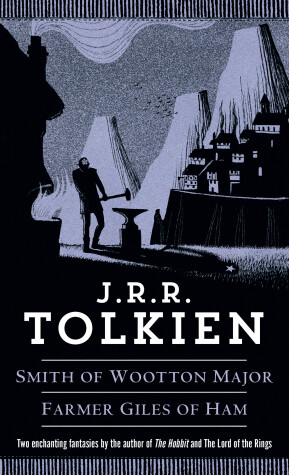
Venture into the imagination of J.R.R. Tolkien with two hard-to-find classic fantasies
Best known for his beloved works of fantasy The Hobbit and The Lord of the Rings, J.R.R. Tolkien was also prolific in writing beyond the confines of Middle-earth. Paired in this volume are two short tales of enchantment and adventure that explore the craft of fantastical fiction in a way that only Tolkien could.
Smith of Wootton Major: The last of Tolkien’s fiction to be published in his lifetime, this is a haunting tale about a boy who unwittingly swallows a faery star, granting him the ability to wander freely between the mortal world and the land of Faery until he grows into the twilight of life and must make a difficult choice.
Farmer Giles of Ham: An imaginative history of the distant past that follows the unheroic and entirely unwilling Farmer Giles as he attempts to expel a cunning but not exactly bold dragon from the borders of the kingdom.
“Smith of Wooton Major” is a beautiful short story for anyone who enjoys a good fairytale—one about Faery itself, and not about a pretty princess looking for true love. It opens with a description of the town and traditions of Wooton Major, where the Master Cook is held in high regard and hosts a special feast for twenty-four children every twenty-four years. Tolkien’s hobbit-ish appreciation for food and good cheer really shines through, and readers cannot help but think Wooton Major sounds like rather a pleasant place to live.
The focus, however, is on what it means to open one’s mind, to accept the possibility and the value of magic. Tolkien paints striking images of Faery, which is lovely but also stern and dangerous. He brings the same seriousness and dignity to this land that he brought to the Elves in The Lord of the Rings.
Unfortunately, not everyone in Wooton Major can believe that this world exists. Contrasted with the star-browed Smith is Master Cook Nokes, who makes light of even the mention of fairies. Partially this is dangerous to him, because the King and Queen of Faery are real and powerful, but it is also very sad. Nokes misses opportunities and great beauty through his own stubbornness.
“Smith of Wooton Major” can and has been read as an allegory, but I encourage reading it for its imagery and its message—that the imagination is important and that is not frivolous. Adults, as well as children, can believe in magic and it is essential that they do so.
Review also posted at Pages Unbound Book Reviews.
Reading updates
-
Started reading
-
6 December, 2012:
Finished reading
-
6 December, 2012:
Reviewed
